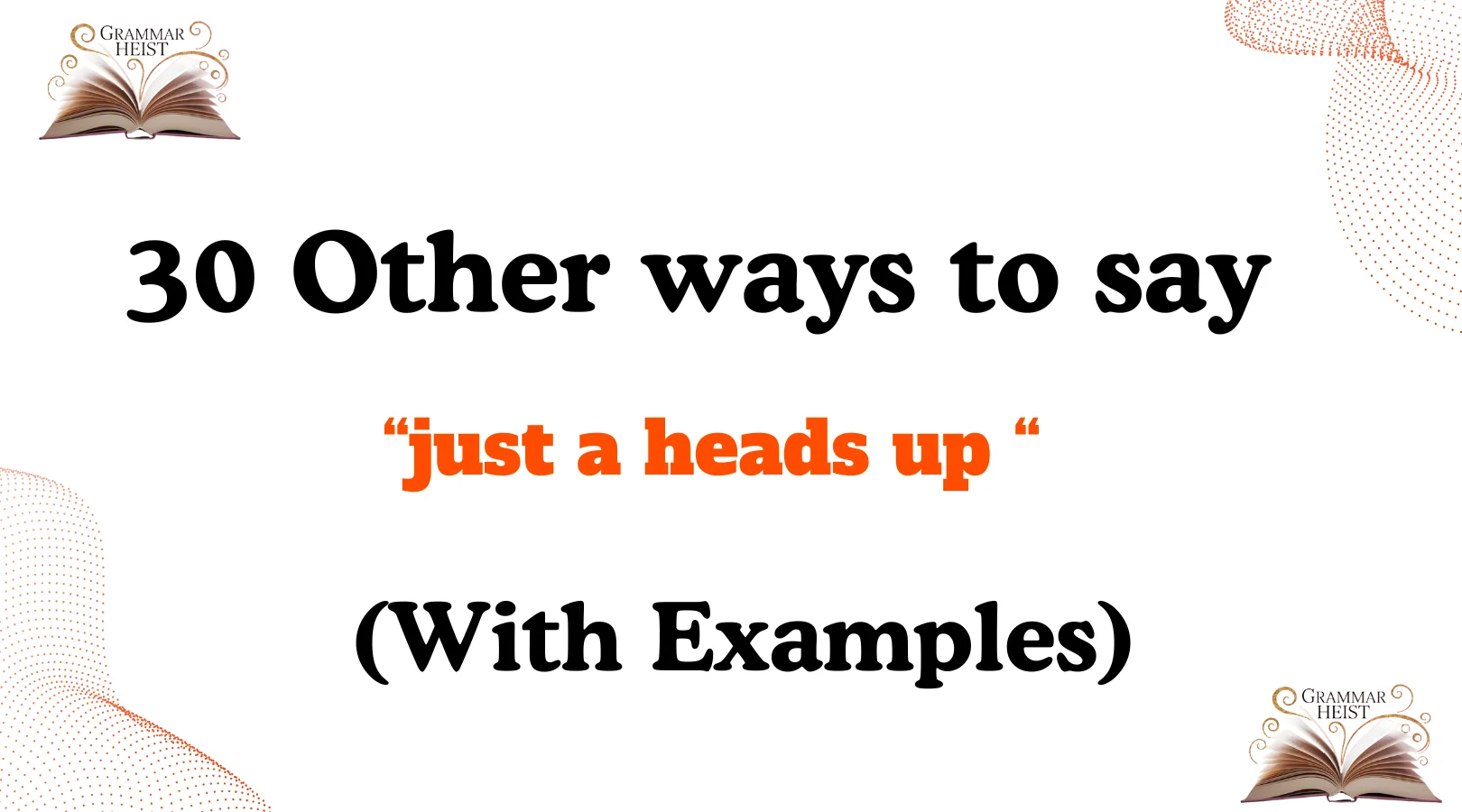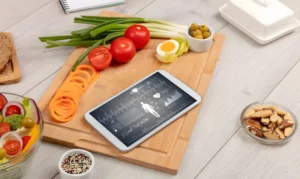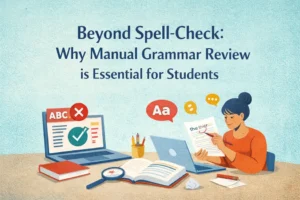Finding the right words in professional communication can make all the difference. While “just a heads up” works in casual settings, using more thoughtful and polished alternatives allows you to show respect, warmth, and clarity. This not only helps your message land better but also ensures your communication feels both professional and personal.
Below, you’ll discover 30 alternatives, each with examples, tone insights, and explanations to help you express yourself with genuine care.
What Does “just a heads up” Mean?
“Just a heads up professionally” is a way of giving someone advance notice about something that may affect them at work. It’s meant to be friendly, informal, and considerate, but it may not always suit more formal or professional contexts.
Is It Professional/Polite to Say “just a heads up”?
Yes, it’s polite in casual business communication, especially with colleagues you know well. However, in formal emails, client interactions, or leadership settings, it may feel too relaxed. That’s why having alternative phrases is so valuable.
Pros or Cons
Pros:
- Feels friendly and approachable.
- Communicates care without being heavy.
- Easy to understand.
Cons:
- May sound too casual in formal situations.
- Can come across as slightly abrupt if not framed with warmth.
- Lacks the professional polish needed for certain contexts.
Synonyms For “just a heads up“
- For Your Awareness
- Kindly Note
- Please Be Advised
- For Your Information
- Just to Let You Know
- Please Note
- Thought You Should Know
- Allow Me to Inform You
- As a Reminder
- Be Informed
- Worth Highlightin
- Just Sharing This in Advance
- Wanted to Point Out
- Keep in Mind
- Just Flagging This
- Wanted You to Be Aware
- Quick Note to Say
- So You’re Aware
- Before You Proceed
- To Keep You Updated
- Advance Notice
- Wanted to Bring to Your Attention
- Just Passing Along
- In Case It Helps
- As a Heads-Up (Polished Version)
- Something to Note
- May I Draw Your Attention
- Just Circling Back With
- Important to Highlight
- In Advance, Please Note
1. For Your Awareness
Scenario: You want to politely inform a manager about a policy update.
Examples:
- “For your awareness, the client meeting has been shifted to Thursday.”
- “For your awareness, the system will be down for maintenance tonight.”
- “For your awareness, the report is awaiting approval.”
Tone: Formal and respectful.
Explanation: This phrase shows professional courtesy and ensures the other person is informed without sounding casual.
2. Kindly Note
Scenario: You’re emailing a colleague about an important deadline.
Examples:
- “Kindly note the submission date is Friday.”
- “Kindly note that access will be restricted after today.”
- “Kindly note the meeting agenda has been updated.”
Tone: Polite and slightly formal.
Explanation: It conveys gentle authority while remaining respectful.
3. Please Be Advised
Scenario: Sharing official instructions with a client.
Examples:
- “Please be advised the new policy takes effect on Monday.”
- “Please be advised we’ll require additional documents.”
- “Please be advised the office will be closed for the holiday.”
Tone: Formal and authoritative.
Explanation: This phrase works well when you need clarity and professionalism.
4. For Your Information
Scenario: Informing your teammate about changes.
Examples:
- “For your information, the budget has been finalized.”
- “For your information, I’ve copied Sarah on this email.”
- “For your information, the client approved the new design.”
Tone: Neutral and professional.
Explanation: A classic business phrase that is clear, concise, and polite.
5. Just to Let You Know
Scenario: Sending a casual but professional update.
Examples:
- “Just to let you know, the files are ready for review.”
- “Just to let you know, the vendor will be late.”
- “Just to let you know, I’ll be out of office tomorrow.”
Tone: Friendly and approachable.
Explanation: Keeps the casual warmth of “heads up” but slightly more professional.
6. Please Note
Scenario: Highlighting a deadline in an email.
Examples:
- “Please note the system will be offline at 10 PM.”
- “Please note that all submissions must be finalized today.”
- “Please note that changes have been applied to your request.”
Tone: Direct and professional.
Explanation: This phrase draws attention politely while maintaining formality.
7. Thought You Should Know
Scenario: Giving a supportive update to a colleague.
Examples:
- “Thought you should know the presentation was well-received.”
- “Thought you should know the manager asked for your input.”
- “Thought you should know the schedule has changed slightly.”
Tone: Warm and conversational.
Explanation: It feels caring and personal, great for team communication.
8. Allow Me to Inform You
Scenario: Formal client communication.
Examples:
- “Allow me to inform you that your request has been processed.”
- “Allow me to inform you of the updated delivery schedule.”
- “Allow me to inform you that approvals are complete.”
Tone: Very formal and polished.
Explanation: Adds a professional flourish, perfect for formal settings.
9. As a Reminder
Scenario: Sending follow-up instructions.
Examples:
- “As a reminder, the meeting begins at 2 PM.”
- “As a reminder, all invoices are due by the 5th.”
- “As a reminder, tomorrow is the final review session.”
Tone: Gentle yet professional.
Explanation: Helps reinforce important details without sounding pushy.
10. Be Informed
Scenario: Communicating an important change to staff.
Examples:
- “Be informed that the office hours will change next week.”
- “Be informed the project deadline has shifted.”
- “Be informed the IT department is updating systems tonight.”
Tone: Formal and direct.
Explanation: Stronger than “note” but still professional.
11. Worth Highlighting
Scenario: Sharing an important detail in a project update.
Examples:
- “Worth highlighting that the budget allocation has been adjusted.”
- “Worth highlighting that we need feedback by Friday.”
- “Worth highlighting that the final decision rests with the client.”
Tone: Professional with a hint of emphasis.
Explanation: This phrase is useful when you want to draw special attention without sounding heavy-handed.
12. Just Sharing This in Advance
Scenario: Informing a colleague before an official update goes out.
Examples:
- “Just sharing this in advance so you’re prepared for the announcement.”
- “Just sharing this in advance before the client call.”
- “Just sharing this in advance so you have time to review.”
Tone: Friendly and considerate.
Explanation: It conveys thoughtfulness by giving others a chance to prepare ahead.
13. Wanted to Point Out
Scenario: Bringing up an overlooked but important detail.
Examples:
- “Wanted to point out that the form needs an extra signature.”
- “Wanted to point out that the data hasn’t been verified yet.”
- “Wanted to point out that the link was broken.”
Tone: Helpful and collaborative.
Explanation: This phrase feels gentle and constructive, making it easier to flag issues.
14. Keep in Mind
Scenario: Offering a reminder during planning discussions.
Examples:
- “Keep in mind that the report needs formatting updates.”
- “Keep in mind the client prefers shorter presentations.”
- “Keep in mind that approvals may take two weeks.”
Tone: Supportive and advisory.
Explanation: Encourages mindfulness without sounding demanding.
15. Just Flagging This
Scenario: Raising a small but important update.
Examples:
- “Just flagging this deadline as it’s approaching quickly.”
- “Just flagging this error in the draft.”
- “Just flagging this client request for your awareness.”
Tone: Neutral, efficient.
Explanation: A common business phrase that is short, clear, and professional.
16. Wanted You to Be Aware
Scenario: Giving advance notice to prevent surprises.
Examples:
- “Wanted you to be aware that changes are happening next week.”
- “Wanted you to be aware that the system may slow down today.”
- “Wanted you to be aware that extra costs may apply.”
Tone: Caring and proactive.
Explanation: Shows concern for the recipient, helping them feel informed and supported.
17. Quick Note to Say
Scenario: Sending a brief message about logistics.
Examples:
- “Quick note to say the client will call at 2 PM.”
- “Quick note to say your documents are ready.”
- “Quick note to say the new updates are live.”
Tone: Friendly, conversational.
Explanation: A casual but professional way to keep communication light.
18. So You’re Aware
Scenario: Offering an informal but professional update.
Examples:
- “So you’re aware, the file was shared with the client.”
- “So you’re aware, the deadline is earlier than expected.”
- “So you’re aware, travel costs weren’t included in the quote.”
Tone: Approachable and clear.
Explanation: Feels like a gentle aside, useful for quick updates.
19. Before You Proceed
Scenario: Preventing mistakes by giving timely input.
Examples
- “Before you proceed, make sure to confirm the client’s approval.”
- “Before you proceed, please check the formatting.”
- “Before you proceed, ensure the document is signed.”
Tone: Guiding and protective.
Explanation: Prevents errors while sounding thoughtful and cautious.
20. To Keep You Updated
Scenario: Sharing progress with a colleague.
Examples:
- “To keep you updated, the project has moved to the next stage.”
- “To keep you updated, we’ve sent the files for review.”
- “To keep you updated, the client is still reviewing our proposal.”
Tone: Transparent and engaging.
Explanation: Builds trust and inclusion by keeping others in the loop.
21. Advance Notice
Scenario: Letting someone know about a schedule change.
Examples:
- “This is just some advance notice about the new deadlines.”
- “Advance notice that the server will be down tomorrow.”
- “Advance notice that we’ll need more staff on the project.”
Tone: Formal and professional.
Explanation: Adds a sense of planning and responsibility to the message.
22. Wanted to Bring to Your Attention
Scenario: Highlighting something important for review.
Examples:
- “Wanted to bring to your attention an error in the spreadsheet.”
- “Wanted to bring to your attention the client’s concerns.”
- “Wanted to bring to your attention a new opportunity.”
Tone: Respectful and professional.
Explanation: A polite way of ensuring someone notices something significant.
23. Just Passing Along
Scenario: Forwarding useful information.
Examples:
- “Just passing along the latest report for your records.”
- “Just passing along the client’s notes.”
- “Just passing along the updated policy document.”
Tone: Neutral and helpful.
Explanation: Keeps communication casual and functional.
24. In Case It Helps
Scenario: Sharing optional but useful information.
Examples:
- “In case it helps, here’s the link to last year’s data.”
- “In case it helps, I attached the updated form.”
- “In case it helps, here’s the quick summary.”
Tone: Supportive and thoughtful.
Explanation: Shows kindness by offering information without pressure.
25. As a Heads-Up (Polished Version)
Scenario: When you still want the phrase but softened for professionalism.
Examples:
- “As a quick heads-up, the client is visiting tomorrow.”
- “As a heads-up, there may be delays this afternoon.”
- “As a heads-up, IT will run tests tonight.”
Tone: Friendly but slightly polished.
Explanation: Retains warmth of the original while making it feel more professional.
26. Something to Note
Scenario: Including a side detail in communication.
Examples:
- “Something to note: the venue has changed.”
- “Something to note is that the policy is updated.”
- “Something to note: extra fees may apply.”
Tone: Neutral and clear.
Explanation: Adds a soft emphasis to details without being too strong.
27. May I Draw Your Attention
Scenario: Formal communication with leadership or clients.
Examples:
- “May I draw your attention to the updated section.”
- “May I draw your attention to the report findings.”
- “May I draw your attention to the attached proposal.”
Tone: Very polite and formal.
Explanation: Sounds professional and deferential, great for important settings.
28. Just Circling Back With
Scenario: Following up gently.
Examples:
- “Just circling back with a reminder about tomorrow’s call.”
- “Just circling back with the requested files.”
- “Just circling back with confirmation on your availability.”
Tone: Polite and approachable.
Explanation: Excellent for follow-ups without seeming pushy.
29. Important to Highlight
Scenario: Stressing a critical piece of information.
Examples:
- “Important to highlight that the deadline is firm.”
- “Important to highlight that compliance must be ensured.”
- “Important to highlight the new approval requirement.”
Tone: Emphatic yet professional.
Explanation: Great when you need to underscore seriousness.
30. In Advance, Please Note
Scenario: Preparing someone ahead of time.
Examples:
- “In advance, please note that the office will be closed Monday.”
- “In advance, please note that feedback is due Thursday.”
- “In advance, please note the system may run slowly.”
Tone: Polished and proactive.
Explanation: Shows professional foresight and care for planning.
Conclusion
By replacing “just a heads up” with more refined and empathetic alternatives, you can strike the right tone for every situation. Whether you want to sound formal, approachable, or supportive, choosing the right phrase ensures your message lands with warmth and clarity.

Emma Rose is a dedicated writing expert with a passion for helping others enhance their communication skills. With a strong background in grammar, language structure, and style, Emma empowers individuals to write with clarity, confidence, and impact. Her approach combines a keen attention to detail with a supportive, personalized touch, ensuring each person she works with improves and grows in their writing journey.













